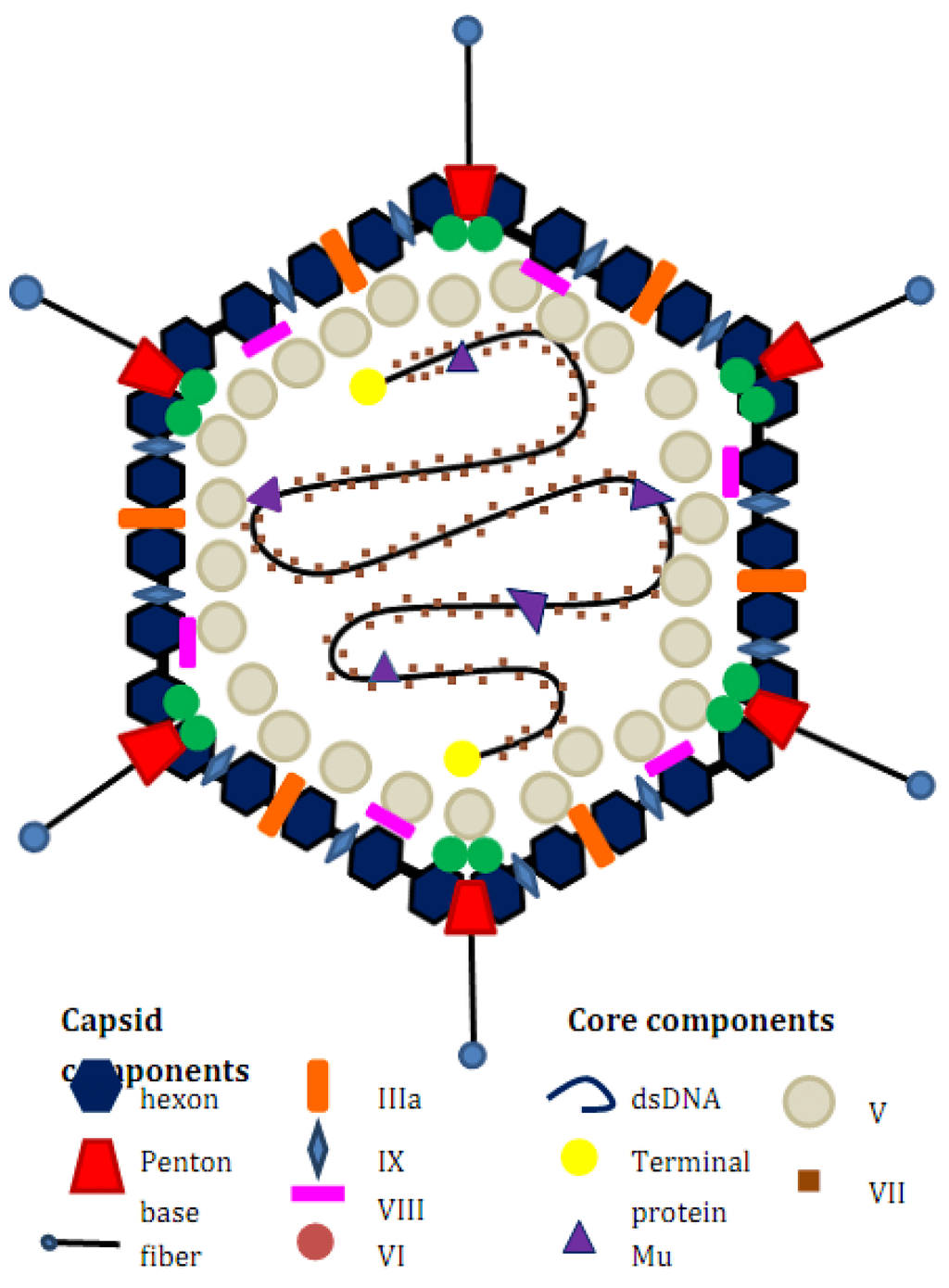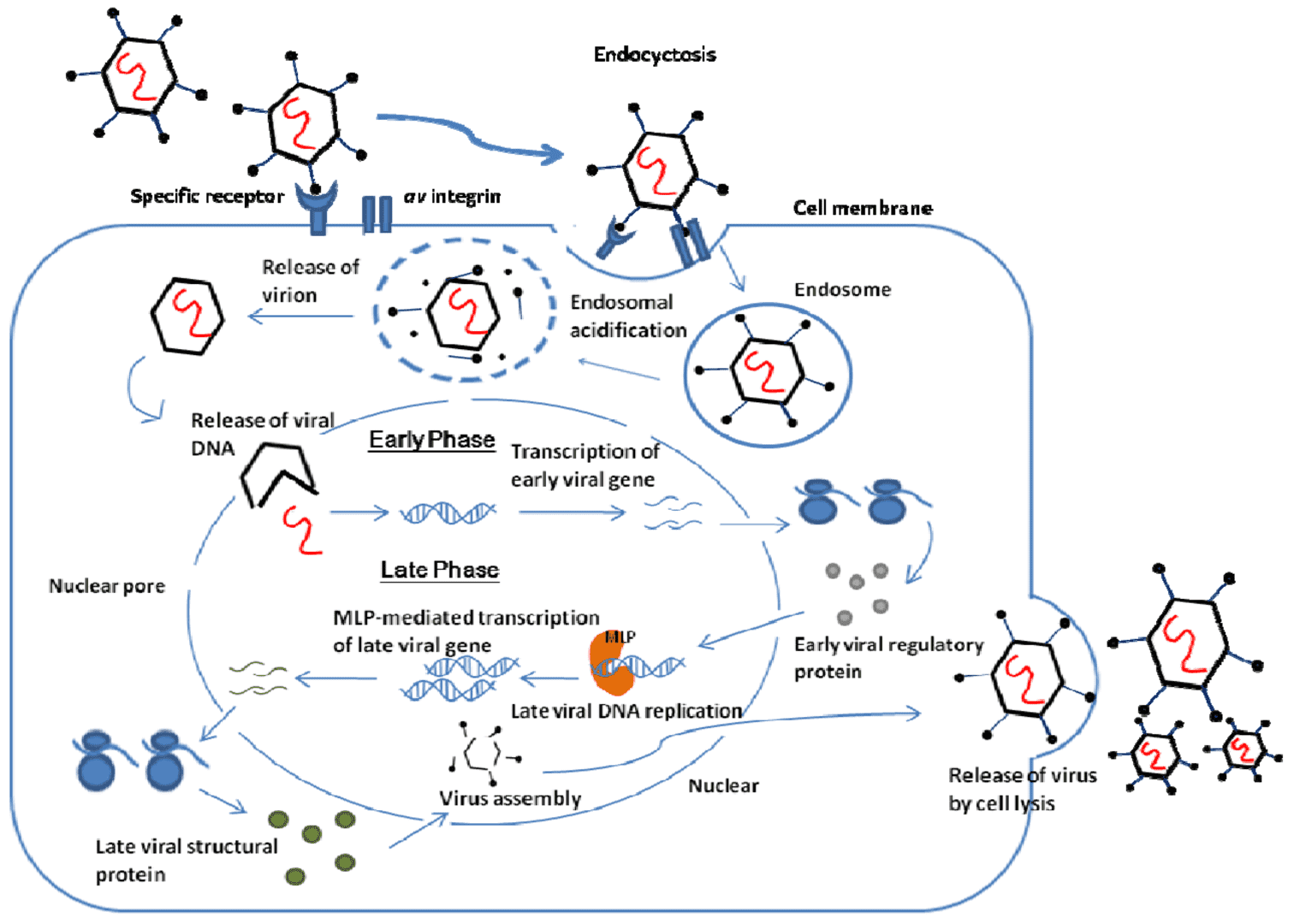In vitro diagnostic (IVD) antibodies are of great importance for diagnosing diseases or ascertaining infection, degree, or extent of a physiological condition. Creative Biolabs provides high-quality adenovirus-specific IVD antibody development services with our unique technology. Here, we give an introduction to the diagnosis of this adenovirus infection.
Adenovirus
Adenoviruses, which belong to the family Adenoviridae, are medium-sized (90–100 nm), nonenveloped (without an outer lipid bilayer) viruses whose essence is an icosahedral nucleocapsid containing a double-stranded DNA genome. Adenoviruses possess a linear dsDNA genome and can replicate in the nucleus of vertebrate cells utilizing the host's replication machinery. They have a wide range of vertebrate hosts. Over 50 different serotypes of human Adenoviruses have been found to cause a broad range of sicknesses, from mild respiratory infections to life-threatening multi-organ disease with an impaired immune system. The symptoms of adenovirus infections are various depending on the adenovirus type, including acute respiratory disease (ARD), epidemic keratoconjunctivitis, pharyngoconjunctival fever, gastroenteritis and diarrhea, acute hemorrhagic cystitis, and neurologic disease (meningitis and encephalitis). Anyone has a risk of adenovirus infection, while it rarely causes serious illness or death. However, infants and peoples with weakened immune systems or chronic cardiac or respiratory disease are at higher risk of getting seriously sick from an adenovirus infection.
 Fig.1 Structure of an adenovirus. (Waye M M Y., 2010)
Fig.1 Structure of an adenovirus. (Waye M M Y., 2010)
Adenovirus Gastroenteritis
Gastroenteritis is commonly defined as vomiting or diarrhea caused by inflammation of the small or large bowel. Viruses are the main cause of a significant percentage of gastroenteritis, while affecting patients of all ages. Viral gastroenteritis ranges from a self-limited watery diarrheal illness (usually <1 wk) in related to symptoms of nausea, vomiting, malaise, anorexia, or fever, to severe dehydration leading to hospitalization or even death. Adenovirus Gastroenteritis is mainly caused by types 40 and 41 adenoviruses, especially in the children less than two years of age. Vomiting and diarrhea symptoms occur about one week after exposure to the virus. Several studies have demonstrated that adenoviruses are closely related to acute infantile gastroenteritis. These adenovirus species that cause gastroenteritis have been designated as enteric adenoviruses (EAds). Adenoviruses could replicate easily in the human intestine and may be cultured from asymptomatic individuals.
 Fig.2 Adenovirus infection and replication pathway. (Waye M M Y., 2010)
Fig.2 Adenovirus infection and replication pathway. (Waye M M Y., 2010)
Laboratory Diagnosis of Adenovirus
The laboratory diagnosis of adenovirus infections mainly includes the used of virus isolation, immunodiagnostic assays, and molecular assays.
Virus Isolation – Adenovirus can be isolated from specimens such as bodily fluids and secretions, urine, and feces. Different cell types are used for the growth and isolation of different strains of adenovirus. It is a sensitive method for adenovirus detection, but this method is costly and time-consuming, taking several days to perform the isolation. Moreover, some adenovirus serotypes are difficult to culture, thus the virus should culture on at least two or three different cell lines in order to maximize the sensitivity.
Molecular Assay – Polymerase chain reaction (PCR) is a relatively quick and sensitive tool based on direct detection of the genetic material of adenovirus in the clinical sample. Depending on the DNA region amplified by PCR, it is possible to distinguish between species and serotypes. However, this technique has a high cost and requires a specialized technical team to perform it, and it is therefore not very accessible.
Immunodiagnostic Assays – Commonly used antibody-based diagnostic assays for adenovirus include complement fluorescent antibody, complement fixation, and ELISA tests. These tests use polyclonal or monoclonal antibodies against different adenovirus antigens. These tests, however, are not very sensitive for the diagnosis of adenovirus infections, compared to cell culture methods and molecular diagnosis. In recent years, more and more effort has been taken in the development of rapid diagnostic tests for adenovirus.
IVD Antibody Development Services Targeting Adenovirus
Monoclonal antibodies are now used for directed detection of enteric adenoviruses via enzyme immunoassay (EIA), from patients with gastroenteritis. Tests specific for each of the enteric adenoviruses, Ad 40 (adenovirus type 40) and Ad 41 (adenovirus type 41), have been developed. With extensive experience, Creative Biolabs has launched a whole series of adenovirus antibody development services for the diagnosis and prognosis of adenovirus gastroenteritis and respiratory infections.
In addition to Adenovirus, Creative Biolabs also focuses on other pathogens of the gastrointestinal disease. If you are interested in our services, please feel free to contact us for more details.
Reference
- Waye, Mary Miu Yee, and Chor Wing Sing. "Anti-viral drugs for human adenoviruses." Pharmaceuticals 3.10 (2010): 3343-3354. Distributed under Open Access license CC BY 3.0, without modification.
For Research Use Only.